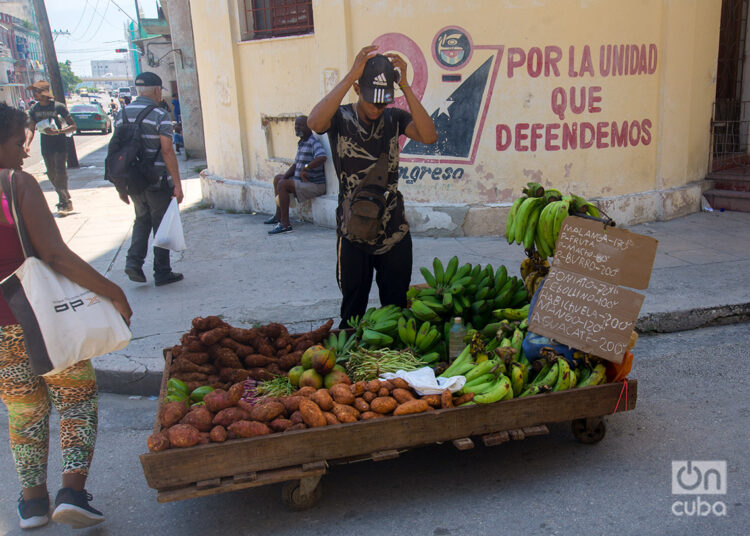The Cuban government announced adjustments to the economic plan and the 2024 state budget to the conditions of a “war economy,” as well as a “single” pricing policy, as part of a new group of measures to face the crisis the country is going through.
The above emerged in the most recent Council of Ministers, in which the island’s authorities admitted an economic decrease compared to the previous estimate and presented the new package, as part of the government’s will to “correct distortions and re-boost the economy,” according to the newspaper Granma.
According to First Deputy Minister of Economy Mildrey Granadillo de la Torre, the measures seek “in essence, to correct macroeconomic imbalances; increase the attraction of foreign currency to the country through different means and concepts; encourage national production, with emphasis on food production; and organize the functioning of non-state forms of management.”
The official affirmed that “among the main actions” is “adjusting the 2024 Plan and Budget to the conditions of ‘war economy’,” even though the official newspaper does not give details about the scope of these adjustments.
Other actions announced are “reducing Budget items to reduce the fiscal deficit in 2024, based on non-executions; define requirements in the budgeted activity for the use of the approved Budget, and centralize the power of approval.”
Also, “allocate monthly financial resources in correspondence with the real income of the month; calculate the fiscal impact of imports of non-state forms of management; grant tariff benefits, including exemptions, for the import of raw materials and inputs for production, as well as conclude the tax system for electronic commerce.”
New pricing policy
In her presentation to the Council of Ministers, Granadillo said that “a single, inclusive pricing policy will be established on equal terms for all subjects of the economy, which includes both the state and non-state sectors.”
The Granma report also does not reveal details about this new policy. However, these days publications on unofficial media have echoed a supposed price “cap” on various products sold by MSMEs and other economic actors.
According to this unconfirmed information, the news would have been given by the Deputy Minister of Finance Lourdes Rodríguez in a meeting with non-state actors and the Ministry of Foreign Trade, and the “capped” products would be chicken, oil, sausages, pasta, powdered milk and detergent.
The measure would be “temporary” and the “caps” on prices would have been determined based on the import costs reported by private importers during the second half of 2023 and the first quarter of 2024.
However, so far the Cuban government has not officially reported on the matter, nor is this supposed “cap” explicitly mentioned in the official report about the Council of Ministers meeting.
What the Council of Ministers did confirm among the new measures is the regulation “to limit the profit in purchases of products and payments for services and inputs carried out by the state sector to the non-state sector,” which was announced days ago and is in force since this Monday.
In this regard, the economist Pedro Monreal considered that this measure, which sets a limit of 30% on profits, “repeats the mistake of the Ministry of Finance and Prices of assuming an erroneous methodology for the formation of prices at the level of the economy (local and national) trying to impose a ‘planned’ profit that disregards real relations of supply and demand.”
“Advance in macroeconomic stabilization”
According to the Granma report, among its measures the Cuban government also plans to begin drawing up the Economy Plan and the State Budget for 2025 “based on the approval of the Global Model and the Government Directives conceived for this process.”
The Cuban authorities also intend to “advance in the implementation of an action plan to solve the existing problems in the bancarization process,” which continues to cause so much controversy on Cuban media and streets.
According to Mildrey Granadillo, “those and other approved decisions” — which are not mentioned in the report — have “a comprehensive nature and are based on the complex situation that exists in the economy” and seek to “advance the macroeconomic stabilization of the country, a complex process which requires coordination and alignment among the global organizations of the economy.”
In this sense, she considered as “necessary actions” “improving planning mechanisms, relationships between economic actors, attracting financing, eliminating tax evasion, and increasing production.”
Commenting on the matter, Prime Minister Manuel Marrero Cruz estimated that this new package is “an important step” with “measures associated with a higher stage” in the implementation of the projections and “impacts on sensitive issues for the population.”
For his part, Minister of Economy Joaquín Alonso confirmed a decrease in the economy at the end of 2023 “compared to the previous year, and the estimate for the first half of 2024,” although the official report does not give figures regarding this decrease.
The minister pointed out that the country’s economic situation “continues to be complex” and, according to Granma, “he insisted on the need to evaluate the causes of what has been happening in the economy, to act on what we should do in the second half of the year.”
Cuba is going through a severe economic crisis marked by a lack of basic products such as food, fuel and medicine, as well as growing inflation and continuous blackouts. This situation has been reinforced by the pandemic and U.S. sanctions, as well as by internal inefficiencies and the low effectiveness of government measures to confront it.










